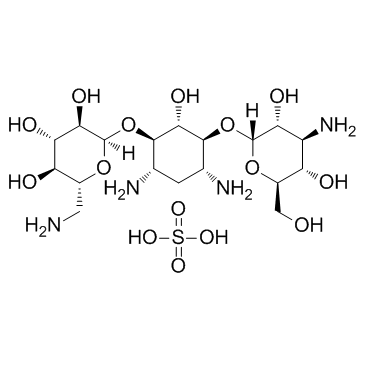All AbMole products are for research use only, cannot be used for human consumption.

In vitro: Kanamycin sulfate at the concentration above 0.0025% has a significant inhibition on the growth of B. bifidum and has no influence on the other four probiotics at incubation 12 h or 24 h. The optimum selective concentration of kanamycin sulfate in MRS media is 0.005% for selective enumeration of B.bifidum.
In vivo: The neurons damage of the DCN caused by kanamycin (500 mg/kg/day) is reversible and autophagy is upregulated in the neurotoxic course of kanamycin on DCN through JNK1-mediated phosphorylation of Bcl-2 pathway in rats. The serum BUN and Cr levels are both increased at the 1st day after the period of kanamycin administration. The neurons expressing LC3 are increased at 1, 7 and 14 days after kanamycin administration in comparison to the control group. Kanamycin treatment results in the increase of autophagy in a time-dependent manner. Kanamycin sulfate (5 mg/kg) and sodium ampicillin (10 mg/kg) administered intramuscularly (i.m.) separately, and then together, to five pony mares, and the ampicillin concentration exceeds 5 mg/mL in inflamed synovial fluid for some 2.5 h after injection, and kanamycin sulfate concentration exceeds 2 mg/mL for 7 h in the pony.
| Cell Experiment | |
|---|---|
| Cell lines | spiral ganglion cells |
| Preparation method | Images of spiral ganglion cells (SGCs) in the basal turn. SGCs were stained for NF200 (red). SGCs of the basal turn in a normal cochlea and in cochleae at 2 weeks and 6 weeks after co-administration of kanamycin and furosemide. |
| Concentrations | 10 μm |
| Incubation time | |
| Animal Experiment | |
|---|---|
| Animal models | Male Sprague-Dawley rats |
| Formulation | 0.9% saline |
| Dosages | 500 mg/kg/day |
| Administration | i.v. |
| Molecular Weight | 582.58 |
| Formula | C18H38N4O15S |
| CAS Number | 25389-94-0 |
| Solubility (25°C) | 30 mg/mL in water |
| Storage |
Powder -20°C 3 years ; 4°C 2 years In solvent -80°C 6 months ; -20°C 1 month |
| Related Antibiotic Products |
|---|
| Puromycin-d3
Puromycin-d3 is the deuterium labeled Puromycin. Puromycin dihydrochloride is the dihydrochloride salt of puromycin. Puromycin is an aminoglycoside antibiotic that inhibits protein synthesis. |
| BSH-IN-1
BSH-IN-1 is a potent and covalent inhibitor of gut bacterial recombinant bile salt hydrolases (BSHs) with IC50s of 108 nM and 427 nM for B. longum BSH (Gram positive) and B. theta BSH (Gram negative), respectively. |
| AAA-10
AAA-10 is an orally active gut bacterial bile salt hydrolases (BSH) inhibitor, with IC50s of 10 nM, 80 nM against B. theta rBSH and B. longum rBSH respectively. |
| Gut restricted-7
Gut restricted-7 (GR-7) is a potent, covalent and orally active pan-bile salt hydrolase (BSH) inhibitor. Gut restricted-7 has a tissue-selective and is restricted to the gut. Gut restricted-7 decreases gut bacterial BSHs and decreases deconjugated bile acid levels in feces of mice. |
| N-Hydroxypipecolic acid
N-Hydroxypipecolic acid (1-Hydroxy-2-piperidinecarboxylic acid), a plant metabolite and a systemic acquired resistance (SAR) regulator, orchestrates SAR establishment in concert with the immune signal salicylic acid. N-Hydroxypipecolic acid accumulates systemically in the plant foliage in response to pathogen attack. N-Hydroxypipecolic acid induces SAR to bacterial and oomycete infection. |
All AbMole products are for research use only, cannot be used for human consumption or veterinary use. We do not provide products or services to individuals. Please comply with the intended use and do not use AbMole products for any other purpose.


Products are for research use only. Not for human use. We do not sell to patients.
© Copyright 2010-2024 AbMole BioScience. All Rights Reserved.
